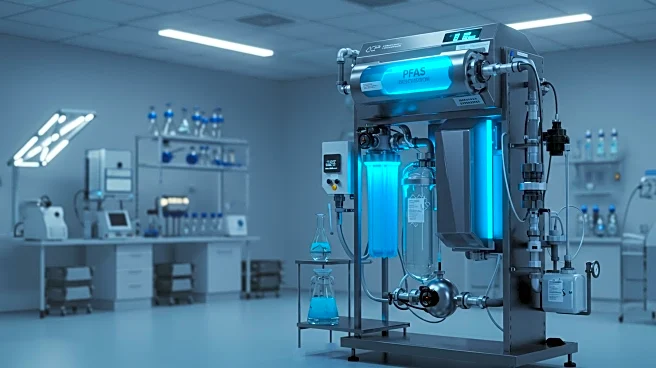What is the story about?
What's Happening?
Aquagga, a start-up specializing in Hydrothermal Alkaline Treatment (HALT) technology, has completed a demonstration project for the U.S. Department of Defense (DOD) aimed at destroying firefighting foam mixtures containing PFAS, known as 'forever chemicals.' These chemicals are found in various consumer products and are notorious for their persistence in the environment and potential health risks. The project is part of a broader effort to remediate over 700 sites suspected of PFAS contamination. The initiative highlights a growing market opportunity for companies specializing in PFAS destruction, as legal and regulatory pressures mount in the U.S. and globally.
Why It's Important?
The destruction of PFAS is crucial due to their widespread use and environmental persistence, posing health risks such as cancer and reproductive issues. The U.S. military's involvement underscores the strategic importance of addressing PFAS contamination, which affects numerous communities. Companies like Aquagga are positioned to benefit from increased demand for effective remediation technologies. The legal landscape is shifting, with lawsuits against the military and chemical manufacturers, and regulatory limits on PFAS in drinking water set to take effect in the U.S. by 2031. This creates a significant opportunity for clean-tech companies to innovate and expand their market presence.
What's Next?
As regulatory pressures increase, more companies are expected to enter the PFAS destruction market, potentially leading to technological advancements and cost reductions. The U.S. government may continue to support initiatives that reduce reliance on traditional disposal methods, such as incineration, which can produce toxic emissions. Stakeholders, including industrial manufacturers and municipal wastewater treatment plants, are likely to explore partnerships with clean-tech firms to address PFAS contamination. The success of pilot projects could pave the way for larger-scale implementations, further driving the market for PFAS remediation technologies.
Beyond the Headlines
The development of PFAS destruction technologies raises ethical and environmental considerations, particularly regarding the management of degradation byproducts. Companies must ensure that their solutions do not introduce new environmental hazards. The focus on PFAS also highlights broader issues of chemical safety and the need for sustainable practices in manufacturing and waste management. As awareness grows, public pressure may influence policy decisions, encouraging stricter regulations and increased funding for research and development in this area.















